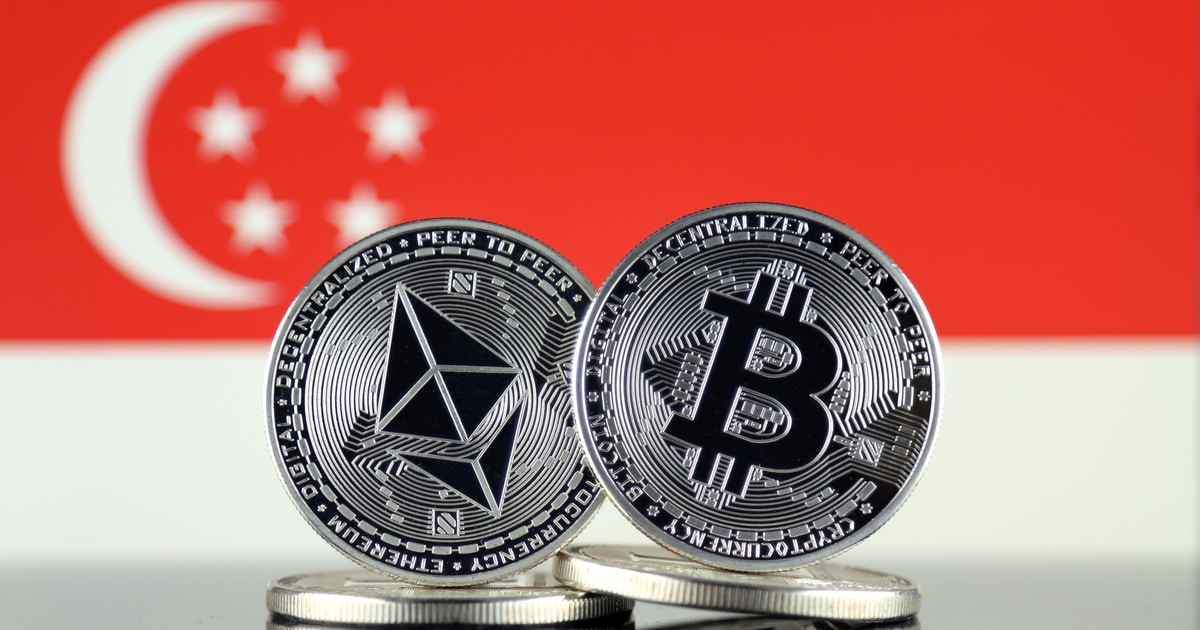Within the past year, cryptocurrencies have gone from being an obscure part of the financial world to taking centre stage. The Wall Street Journal reported that as of May 2021, the total value of all cryptocurrencies was worth around US$2.2 trillion, up from $260 billion a year ago.

A cryptocurrency is a digital asset that can be used to buy goods and services. However, it differs from fiat currency as it uses a decentralised, or peer-to-peer online ledger — a blockchain — to secure transactions.
The blockchain cannot be altered, which means that funds and goods can be transferred trustfully. This increases transparency and reduces the possibility of fraud.
In the span of 12 months, bitcoin — the world’s most popular cryptocurrency — exploded from trading at US$8,166 on 8 March 2020 to hitting record highs of over US$61,000 in March 2021.

Other cryptocurrencies such as ether and dogecoin have also surged to heights that few would have predicted a year ago.
This is fuelled by individual investors’ use of social media platforms such as Twitter and Reddit to send asset prices soaring. Tesla founder Elon Musk’s embrace of cryptocurrencies and the U.S. listing of cryptocurrency exchange Coinbase Global Inc. only raised interests further.

The rise in cryptocurrency acceptance from the public has been accompanied by increased institutional interest, including big names like HSBC, Goldman Sachs, and JPMorgan.
Earlier this year, a Singapore investor made waves in the art world when he spent a record-breaking US$69 million (S$93 million) worth of non-fungible tokens (NFTs) on a digital art piece.
NFTs operate as a new type of digital asset, and have rapidly gained popularity in recent years. They are unique cryptographic tokens that exist on the Ethereum blockchain and cannot be replicated.
Singapore artists and fashion players are also tapping on this NFT trend. Digital clothing has also been making waves in the NFT space, which consumers can purchase as well.
Singapore’s growing crypto scene

Like the rest of the world, interest in cryptocurrencies in Singapore has also been growing.
PwC Singapore’s survey for the Singapore Blockchain Ecosystem Report 2020 assessed the developments of blockchain-related activities in Singapore, with blockchain emerging as one of the top three technology trends in Singapore for 2021.
Singapore has long been a financial hub and economic powerhouse, and with Asia’s two largest countries — India and China — banning or restricting access to crypto, Singapore has emerged as a haven for blockchain and crypto companies in the region.
Government initiatives and institutional support from banks like DBS has heightened cryptocurrency’s visibility, legitimacy and acceptance amongst Singaporean audiences as a valued asset class.
According to Global Macro Investor Raoul Pal, Singapore’s sovereign wealth fund Temasek Holdings has been purchasing Bitcoin from miners.
This information was revealed by Raoul during a recent podcast appearance. He also repeated the same claim on Twitter. The information was not confirmed by Temasek Holdings.
However, it is still evident that large institutions in Singapore are supportive of the cryptocurrency boom.
Institutional support for cryptocurrency developments

DBS has set up a digital exchange which enables investors to tap into a fully integrated tokenisation, trading and custody ecosystem for digital assets.
The bank will leverage blockchain technology to provide an ecosystem for fund raising through asset tokenisation and secondary trading of digital assets including cryptocurrencies.
In May, DBS Private Bank announced that it launched a trust solution for cryptocurrencies via the bank’s wholly-owned trust company, DBS Trustee. This will allow its private banking clients to invest, custodise and manage digital assets. Previously, this was only accessible only to institutional and accredited investors.
The trust offering applies only to Bitcoin, Ether, Bitcoin Cash and XRP, which are the four cryptocurrencies hosted on the DBS Digital Exchange.
According to DBS, the digital exchange, has a daily trading volume between S$30 to S$40 million, and currently has 120 investors onboard.
When asked about the potential growth of the digital exchange, DBS CEO Piyush Gupta shared an optimistic view of the future of cryptocurrency.
I do think given the amount of interest in all the four cryptos that we trade now, that interest is quite high. Therefore, I do think it will pick up. But whether it picks up to tens of millions, or hundreds of millions of income over the next few years, it’s hard to say.
So my thinking is, we should get in there, figure it out and grow and then we’ll get a better sense for how big this could be in time.
– Piyush Gupta, DBS CEO
Other than the digital exchange which it launched last December, DBS also announced a partnership with Temasek and J.P Morgan this April to set up a new blockchain-based global payment platform.
Called Partior, it aims to disrupt the traditional cross-border payments ‘hub and spoke’ model, resulting in a more efficient clearing and settlement for payments.
These efforts by DBS, J.P. Morgan and Temasek build on their past work as part of Project Ubin, an industry initiative by the Monetary Authority of Singapore (MAS) to explore the application of blockchain technology involving multi-currency payments and settlements.
Regulating the fintech landscape

To keep pace with the ever-changing fintech landscape, the Monetary Authority of Singapore (MAS) enacted the Payment Service Act. The act has been crucial in promoting fintech growth through clear regulatory frameworks while safeguarding consumers.
In January 2020, the MAS devised a new version of the Payment Services Act (PS Act) to help consumers gain confidence in ePayments and offer more protection against issues that could arise within the digital money space.
It is a comprehensive regulatory framework for companies handling activities relating to digital assets, including payments and trading.
Under the Act, a person must not carry on a business of providing any type of payment service in Singapore, unless the person:
- has in force a licence that entitles the person to carry on a business of providing that type of payment service; or
- is an exempt payment service provider in respect of that type of payment service.
According to MAS, over 300 firms in the nation have requested for licenses to operate services in payments and crypto exchanges in the city.
These services include providing account issuance services, domestic money transfer service, digital payment (cryptocurrency) token services, and more.
Among the applicants are prominent tech companies like Alibaba Group Holdings Ltd. and Ant Group, Binance Holdings Ltd., as well as Google’s parent company Alphabet Inc.
The authority’s chief financial technology officer, Sopnendu Mohanty, said in an interview with Bloomberg that the MAS is still processing the applications of the Payment Services Act.
These companies have been operating under a grace period since the regulator made the new Payment Services Act effective in January 2020.
A look at Singapore’s crypto map
Singapore’s blockchain and cryptocurrency ecosystem has seen substantial growth. This includes homegrown and international companies that are in the digital asset and tokenisation space, staking and lending, exchanges and trading, as well as advisory and consulting.

The world is full of untapped assets — from private equity to real estate. Investors have traditionally traded these assets on paper, which is a time consuming and complicated process. Asset tokenisation is the process of converting ownership rights in a particular real-world asset into a digital token on a blockchain.
Many assets can tokenised and moved to the blockchain, from financial instruments like stocks and bonds, to gold, and even art. This helps to decrease the barriers to entry and frictions to information exchange and trade.
On the other hand, staking and lending allows cryptocurrency investors to earn tokens. Staking is where users agree to pledge money to a network in order to help it validate transactions, while lending refers to loaning cryptocurrencies in return for interest payments.
A cryptocurrency exchange, or a digital currency exchange is a business that allows customers to trade cryptocurrencies or digital currencies for other assets. This includes conventional fiat money or other digital currencies.
Hardware and payment gateways provide payment systems that allow merchants to accept cryptocurrencies. Finally, advisory and consulting companies are firms that help startups and enterprises innovate in the blockchain industry.
This is just the beginning
For the cryptocurrency industry to evolve and fulfil its potential, we have to look at it as more than an investable asset, and consider its real-life use cases and value that the technology can provide.
Many entrants into the cryptocurrency industry are also developing features to increase the real world spending applications of digital currencies.
In this “utility phase”, crypto becomes more than just a store of value, powering a range of financial services. For example, Singapore ride-hailing startup Ryde launched a cryptocurrency payment feature that allows you to top up your RydePAY wallet using Bitcoin.
Gorilla Mobile, a new mobile virtual network operator (MVNO) which just launched in Singapore, makes use of the blockchain to power its SwitchBack feature. This feature lets users convert their unused mobile data into digital tokens, known as GorillaGo tokens, which are powered by Ethereum.
The proliferation of cryptocurrency into our everyday lives coupled with the strong institutional and governmental support makes it very likely that crypto is here to stay.
The growing amount of use cases available also points to its large growth potential, signalling that the crypto map of Singapore is only going to grow in the coming years.
Cryptocurrency and blockchain technology is a key content pillar for Vulcan Post. You can find the rest of our cryptocurrency coverage here.
VP Label puts together all the best local products for you to discover in one place. Join us in supporting homegrown Singaporean brands:
Featured Image Credit: Blockchain News








